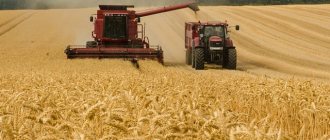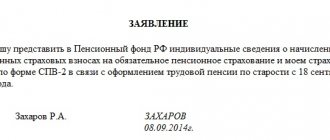The approved list includes more than 500 professions, positions and specialties of employees of agricultural enterprises, collective farms, farms engaged in all types of crop production, livestock farming, and fish farming. The list also includes workers of machine and tractor stations, intercollective farm organizations, and agricultural cooperatives. The increase will affect not only ordinary workers, but also managers: directors of state farms, chairmen of collective farms, heads of workshops and brigades, etc. Related specialties were also included in the list: hydraulic engineers, land reclamation workers, land managers, power engineers, etc. The main thing is that their place of work is an agricultural enterprise.
In addition, along with the list of professions, the government also approved rules for calculating periods of activity that are included in work experience in agriculture. According to the resolution, in order to receive an increased fixed payment towards a pension (we are talking about two types of pensions: old-age insurance and disability insurance), you need to work in agriculture for at least 30 calendar years. In monetary terms, the “rural” increase in pension will be 1333.6 rubles, that is, 25 percent of the fixed payment, which from January 1, 2020 will increase to 5334.2 rubles.
Another important point: according to the rules, citizens who continue to permanently reside in rural areas will receive an increased fixed pension payment. If a citizen is registered in a rural locality and this is reflected in his pension file, there is no need to confirm his place of residence. If we are talking about the actual place of residence, you will need to submit an application to the territorial body of the Pension Fund or the multifunctional center of public services. Moreover, if a pensioner chooses to have the pension delivered by mail to the place where he lives (and not to a bank account), then annual confirmation of residence is not required.
The main condition for an increase is 30 years of work in agriculture
Important point. Government Resolution No. 1440 stipulates that the Ministry of Labor and Social Protection, on the proposal of the Ministry of Agriculture and in agreement with the Pension Fund, may establish “the identity of works, industries, professions, positions, specialties” provided for by the approved list, if any agricultural work, production , professions, positions and specialties had “other names.”
As the head of the Ministry of Labor, Maxim Topilin, explained, the increase will be calculated without an application; you do not need to contact the Pension Fund to receive it. But if necessary, it will be possible to obtain clarification on this payment from the Pension Fund.
The future of agriculture
According to experts, by 2050 the population will increase by 2 billion people. To prevent the world's population from facing the problem of hunger, there will be a need to increase food production. This means that there will be a huge demand for agricultural specialists.
Of course, the industry is facing global changes. The latest technologies are being successfully introduced into production activities, facilitating human labor and making it possible to increase the efficiency of farms several times. Specialists will have to expand their knowledge and skills in order to maintain the position of a true professional and always be in demand at the labor exchange.
Crop professions
Mostly grains and vegetables are grown in the Russian Federation. Accordingly, the following specialties are in demand:
- agronomist - plans, regulates and improves production, organizes the activities of the team;
- breeder - responsible for the selection of varieties, supervises the special care of crops;
- storage and processing technician;
- gardener - engaged in growing fruit crops and fruits;
- vegetable grower - takes care of root crops, potatoes;
- machine operator - works on agricultural machines.
Depending on the type of production, professionals with a narrower specialization may be required.
The work of a plant grower is not always hard physical labor. This industry is unthinkable without machines. True, these machines often turn out to be outdated - not all collective farms were able to switch to market conditions of existence.
Crop vacancies
What professions are considered agricultural?
The agricultural and agrarian sphere is associated not only with the cultivation of crops used for food production. There are several directions and many interesting professions in this industry.
Agricultural and agricultural professions:
- agronomist;
- livestock specialist;
- agricultural technologist;
- vet;
- dog handler;
- agrochemist;
- landscape designer;
- livestock breeder;
- machine milking operator;
- machine operator;
- beekeeper;
- agroecologist;
- agricultural engineer;
- tractor driver;
- woodworking technologist;
- huntsman;
- ichthyologist-fisherman, etc.
§ 5. Officials on the collective farm
1. Collective farm officials can be either elected (chairman, members of the board, members of the audit commission) or appointed (foreman, farm manager, accountant, etc.). Among the officials of the collective farm, the foreman of the permanent production team occupies a special place. He is appointed by the board from among the most experienced and trained collective farmers for a period of at least two years.
In his work, the foreman of the production team is directly subordinate to the board and chairman of the collective farm.
By supervising the team, the foreman ensures that the team completes production tasks in a timely manner. He participates in the development of the collective farm’s production plan and annual production tasks for the brigade, and draws up the brigade’s work plans for periods of agricultural work. The foreman accepts draft cattle, machinery and agricultural equipment from the collective farm board under an act and, in order to avoid deprivation of personal responsibility, assigns them to individual collective farmers. He assigns collective farmers to work taking into account their production qualifications, experience and physical strength, ensures that collective farmers fulfill and exceed production standards with high quality work and uninterrupted maintenance of the work of tractors and combines in the brigade.
The foreman accepts work from collective farmers, participates in accepting work from the tractor brigade of the MTS and the forest protection station, keeps records of the implementation of planned tasks, records of the means of production assigned to the brigade, records of the harvest, records of the work of team members and records the workdays worked by each collective farmer in their work books. .
The most important responsibility of the foreman is to strengthen labor discipline in the team. He monitors the observance by members of the brigade of the Internal Regulations and the fulfillment by collective farmers of the mandatory minimum of workdays both for the year as a whole and for individual periods of work. In cases of violation of labor discipline by individual members of the brigade, the foreman promptly informs the collective farm board about this in order to take appropriate measures.
The foreman organizes socialist competition in the brigade, holds production meetings at which the fulfillment of production tasks by the brigade, the fulfillment of the competition obligations undertaken by the brigade, the state of labor discipline, etc. are discussed. All property assigned to the production brigade is at the disposal of the foreman and can be taken only with the permission of the foreman or the collective farm board. Without the knowledge of the foreman or the collective farm board, it is not permitted to recall collective farmers from the brigade to other work.
2. According to the resolution of the Council of Ministers of the USSR dated April 19, 1948 “On measures to improve organization, increase productivity and streamline wages on collective farms,” the collective farm board may appoint the head of a livestock farm if there are breeding stock: on a horse breeding farm - 20 mares, on a farm cattle - 35 cows, on a pig farm - 20 sows, on a sheep farm - 800 ewes, and on sheep and fur farms - 200 ewes.
On collective farms with fewer breeding stock, livestock managers may be appointed.
On large dairy and pig farms, for every 100 cows and 30 sows, by decision of the general meeting of collective farmers, foremen are appointed who are not exempt from livestock care work. Managers of livestock farms and managers of livestock production, as a rule, directly supervise livestock teams. The functions of these teams are approximately the same as the functions of production team leaders, taking into account, of course, the specifics of livestock farms.
3. According to Art. 24 of the Model Charter of the agricultural artel, for bookkeeping and property accounting, the board selects from the members of the collective farm or invites to hire an accountant.
An accountant (accountant) is appointed by the board of the collective farm with subsequent approval by the general meeting of members of the collective farm. The removal of a bookkeeper (accountant) from work is carried out by a general meeting upon the recommendation of the board and the conclusion of the district department of agriculture. Administratively, the accountant is subordinate to the board and chairman of the collective farm.
The accountant (accountant) of the collective farm is entrusted with the duties of keeping records of all business transactions of the collective farm, making timely entries in the land register book, maintaining operational reporting and submitting it within the established time frame, storing books and documents, as well as contracts and obligations of the collective farm and monitoring their implementation, draw up annual reports and income and expenditure estimates of the artel in a timely manner, and conduct the clerical work of the collective farm.
All expenditure documents of the collective farm are signed by the chairman or his deputy and the collective farm accountant.
4. The Resolution of the Council of Ministers of the USSR and the Central Committee of the All-Union Communist Party of Bolsheviks dated September 19, 1946 “On measures to eliminate violations of the Charter of the agricultural artel on collective farms” revealed in many collective farms excessive staffing of the administrative and management apparatus and excessively high costs of workdays and funds for their payment. The Council of Ministers of the USSR and the Central Committee of the All-Union Communist Party of Bolsheviks obliged the leaders of local party and Soviet organizations to put an end to the practice of stealing workdays on collective farms, to check the staffing levels of all collective farms within two months, to reduce inflated staffing levels and to bring the costs of workdays to pay for them in accordance with the Charter of the agricultural artel.
In accordance with this resolution, a lot of work was done locally to reduce the staff of administrative and service personnel on collective farms.
In order to further reduce staff on collective farms and streamline the expenditure of workdays on their payment, a limit of workdays spent on paying administrative and service personnel has been established, depending on the total production of workdays on the collective farm for the year. In this case, the administrative and service personnel of the collective farm include: the chairman and his deputy, accountants, storekeepers, managers of households and subsidiary enterprises, accountants, letter carriers, watchmen, workers of nurseries, gardens, playgrounds, public catering and other persons.
Workdays accrued to foremen of field, vegetable, orchard-grape brigades, managers of livestock farms, agronomists, livestock specialists, veterinarians, veterinary paramedics, as well as collective farmers engaged in the protection of crops, currents, orchards, tractors and MTS machines, should be attributed to the production costs of the corresponding branches of the collective farm economy.
In order to economically spend workdays on paying administrative staff, collective farms are recommended to widely use the practice of combining positions.
Agricultural professions that will remain relevant
It is no secret that every year many specializations lose relevance. People who choose to study a profession related to agricultural activities fear that they will not be in demand in the future.
According to the results of numerous studies, demand for many agricultural and agricultural professions will increase in the near future, which means that a specialist in this field will never be left without work.
Which professions will remain relevant:
- agronomist;
- agricultural machinery operator;
- agricultural ecologist;
- eco-specialist;
- agricultural engineer;
- technologist;
- livestock specialist;
- veterinarian, etc.
Livestock specialties
Livestock farming in Russia is mainly poultry farming and raising cattle (cows) for the purpose of producing milk or meat. Raising pigs, sheep, goats, and rabbits is less common.
Here is the range of animal husbandry professions:
- veterinarian – treats livestock, monitors the epidemiological situation;
- livestock specialist - deals with selection, distributes pastures and feed, provides favorable conditions for keeping animals;
- feed preparation operator - responsible for feeding animals;
- milkmaid - milks cows, cares for them;
- zoo engineer - organizes events to increase the efficiency of the complex;
- poultry house operator (poultry farm operator) - takes care of the chickens;
- technical engineer - configures and repairs equipment.
Also, modern farms usually have sales and advertising managers and marketers on staff.
What are the pros and cons of working in poultry farms or farms intended for raising livestock?
This work, as a rule, is paid a little better than field work. It is widely in demand. However, the responsibilities of a livestock breeder are quite difficult: unfortunately, not all farms are equipped with modern equipment.
Find the latest vacancies in the industry as a whole here. Please note that some specialists with an agricultural education have a chance of finding a job in Moscow - see offers for veterinarians and livestock specialists.
Professions of the future in agriculture
With the advent of new technologies on the labor market, new professions in demand in the agricultural sector also appear. Let's consider the highest priority specialties of the future.
City farmer
In the future, farming will be organized not only on country plots of land, but also within the city, right on the roofs of multi-storey buildings and houses. Autonomous farms are made from environmentally friendly structures, where you can raise animals and grow various crops.
Urban rooftop farming has already been successfully practiced in Singapore. According to experts, in the near future such farms will appear in different cities of the world. This will lead to demand for the city farmer specialization. The task of such specialists will include the design and arrangement of farms on the roofs of buildings, as well as servicing agro-industrial farms.
Agronomist
In the coming decades, the demand for qualified agronomists will continue. But such professionals will have to take on another part of the work related to the economic sphere. Simply put, the specialty of agronomist-economist will appear in the ranking of the most popular professions.
Eco-specialist
There are a lot of low-quality food products on the modern food market. People interested in maintaining health for many years try to buy environmentally friendly farm products.
Eco-specialists can provide the population with such goods, who will control the quality of the products and create all the necessary conditions for the creation of environmentally friendly raw materials.
Agricultural engineer
With the advent of new technologies, the work of ordinary mechanics has become significantly more complicated. Agricultural engineers with knowledge of programming, network technologies and microelectronics will be able to repair smart equipment. The specialists’ task will include repair, maintenance and adjustment of modern agricultural machinery.
Biohacker
According to experts, in the next 20-30 years there will be a demand for biohackers. These specialists will hack the genetic codes of organisms, which will be especially appreciated by fans of unfair competition.
Professions from the past: collective farmers, coopers, wine handlers
In the pre- and post-war times, several Jewish collective and state farms operated successfully in the Derbent region.
Their names corresponded to the revolutionary impulses of the Soviet government and bore the names of the leaders: “Path to Communism”, “New World”, “Defense of the Country”, “Beam”; named after Lenin, Stalin, Kaganovich, Voroshilov, Molotov, Erlich, Smidovich, Madatov, Dakhadaev, Karl Marx.
In addition to grape seedlings, vegetables, fruits and grains were grown on collective and state farm fields.
Vineyards picturesquely surrounded the ancient city and the Derbent region. The main part of the harvested grapes was used as raw material for wineries and cognac factories. And where there are raw materials, there is, of course, work.
In this article I would like to touch on three common professions of that irretrievably gone time. These are collective farmers, coopers and wine distributors.
Collective farmer
I became acquainted with the work of collective farmers as a child. One day, my grandmother’s sister Senem took me, an eight-year-old girl, to work with her.
This was in 1968, a time when collective farms were unprofitable, when most of them were merged into one large collective farm or transformed into state farms. Long trucks loaded with grapes drove along the streets of Derbent, and the neighboring boys waited for them at intersections to grab onto the wooden side and grab a couple of bunches of grapes.
The work of collective farmers was considered seasonal; they rested mainly in the winter, harvested crops in the fall, and tied up the vineyards in the summer and spring.
Among the collective farmers there were workers of various professions: machine operators, drivers, foremen, team leaders, agronomists, accountants, managers and even cultural workers (artists) of the collective farm theater.
The heyday of the collective farm movement occurred in the pre-war period. Difficulties began when almost all the men went to the front during the war, and a heavy wartime burden fell on the shoulders of women and their teenage children.
Distinguished collective farmers were deservedly awarded with Certificates of Honor, high titles of Heroes of Socialist Labor and orders. Lenin.
To determine the exact meaning of the word “collective farm,” I turned to Wikipedia for help. It says that the word “collective farm” was formed from two words: collective and economy.
In the USSR, it meant a form of rural management in which the means of production were jointly owned and under public management of its participants.
The results of labor were also distributed by a common decision of the participants. Income was distributed according to the quantity and quality of labor - according to workdays.
In 1966, wages based on workdays were replaced by guaranteed wages.
Analogues of collective farms in other countries: “kibbutz” in Israel and “people’s communes” in China.
The first collective farms in Soviet Russia began to emerge in 1918. In parallel with collective farms, state farms were created on the basis of specialized farms (for example, stud farms). State farm workers were paid wages according to standards and in cash; they were hired workers, not co-owners.
With the collapse of the Soviet Empire, collective farms ceased to exist and were transformed into economic societies, production cooperatives, partnerships or peasant (farm) farms (analogous to a private unitary enterprise).
Cooper
This profession was very common in the pre- and post-war years. Coopers were considered craftsmen who made barrels. The craft was called “cooperage”. Wooden barrels were necessary for the production of wine, cognac and for preparing pickles. The cooper, using an ax and other carpentry tools, fitted the rivets of the barrel one to another, planed them, made folds (zautori) with a hammer, drove the bottom into them and tied everything together with wooden or iron hoops.
In the large basement of our parents' house on the street. Pushkina, 24 there were always such barrels.
In those years, many Derbent residents made their own homemade wine and vinegar, and therefore many of them kept such barrels in their bins. And the pickles were stored in large barrels for a long time. True, the barrel pickles had a peculiar woody taste.
Before they began to bottle wine, the work of a cooper was very common. In the shops where they were made there was always a melodious sound from the impact of the devices. And a man who worked as a cooper necessarily received the name of the profession as a nickname for his name.
Among my distant relatives, I remember well the name “Simkho-bondur”.
Wine product guide
The profession of wine guides was considered very prestigious among Derbent men.
As winery workers, guides regularly escorted barrels of wine, mostly to the far reaches of Siberia and the Far East.
In the post-war period, almost every family in the Caucasus had many children (from five to ten children). And when there are many children in a family, rarely a woman could afford to go to work, and many husbands did not allow them to do so. So the head of the family had to travel as a guide in order to financially provide for a large family.
Many of the guides sometimes took their wives with them. Often, one train consisted of several freight cars from the Derbent Winery, probably so that the conductors did not travel alone.
Unfortunately, this work was sometimes fraught with risk; there were cases when a conductor died on the road at the hands of drunken bandits.
The work of a guide was also considered seasonal; in the winter they rested, and the rest of the year they went on regular business trips to accompany wine products.
My uncle Donil worked as a conductor, and every time he returned from a long flight, he always brought something in short supply. And among the products - tangerines, bananas, and candies in multi-colored wrappers. Every time he talked about how the trip went. It was interesting to listen to his stories about the places he managed to visit.
Time passes, one era gives way to another. Gone is the era when ancient Derbent was surrounded by grape seedlings and collective and state farms operated successfully. When in the morning the collective farmers hurried together to work on the grape plantations. There are no longer huge workshops where master coopers in a monotonous chorus made heavy barrels. And the profession of “wine guides” has also quietly become a thing of the past.
It was a special time when one of the large communities of Mountain Jews lived compactly in the Caucasian land, in the Derbent region of Dagestan.
Time passes, and as always it dictates its own rules to us. New professions are appearing, and those that were once in demand have quietly faded into history...
Top 10 in-demand professions of the future in the agricultural sector
To make it easier for young applicants to find a promising profession of the future, we have compiled a rating of agricultural and agricultural professions that will be in high demand in the coming decades.
Top 10 professions of the future:
- Agroinformatician – development and implementation of new technologies to optimize production.
- GMO agronomist - studying the principles of GMO products in agriculture, introducing biotechnological advances, obtaining new products with specified properties.
- Operator of automated agricultural equipment - management of automated equipment in farming and production.
- City farmer.
- Agricultural ecologist – development of principles for waste disposal while preserving the environment.
- Agricultural engineer.
- Biohacker.
- Agronomist-economist.
- Technologist.
- Drone operator - monitoring and managing drones, analyzing and making recommendations for improving technological processes.
Where to get agricultural education
Agricultural education can be obtained at a technical school or university. In Russia there are many educational institutions of different levels, where they train specialized specialists in the agricultural and agrarian sphere.
You can get an education in your chosen profession remotely through specialized courses. The educational process can be comfortably combined with work. This method of obtaining agricultural education is also convenient for people living remotely from the city, where institutes, technical schools and other educational institutions are mainly concentrated.




